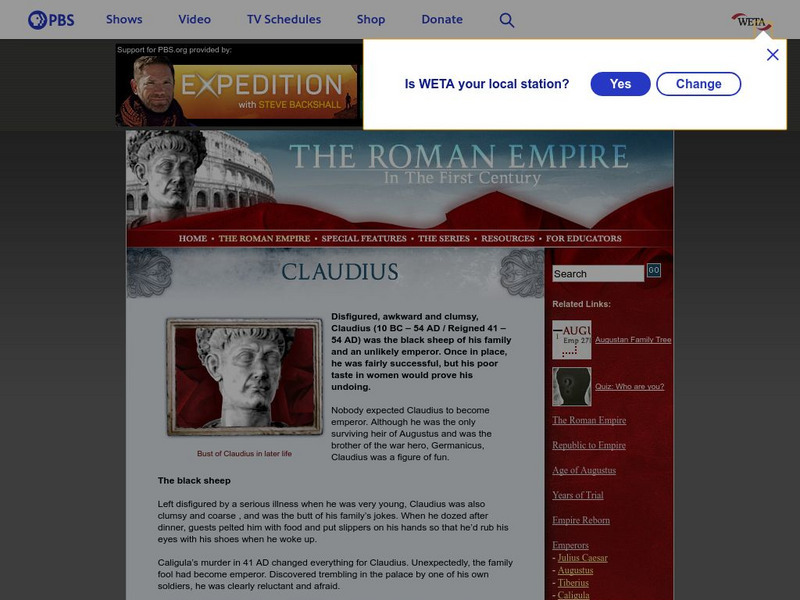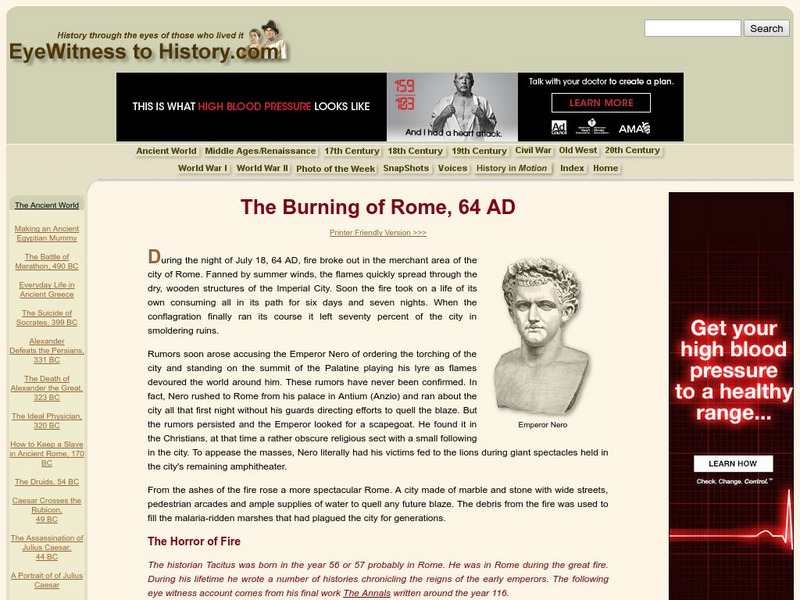Forum Romanum
Outlines of Roman History: Julian Emperors: Reign of Nero
Find out about the infamous Nero, the burning of Rome, and his persecution of the Christians in this passage from William Morey's 1901 textbook.
Massachusetts Institute of Technology
Mit: Open Course Ware: The Making of a Roman Emperor
Explore this impressive list of readings and possible writing/discussion ideas regarding the Early Emperors focused mainly on Augustus and Nero.
Loyola University Chicago
De Imperatoribus Romanis: Nero
Biography of Nero contains good, balanced information about this often misunderstood emperor.
Franco Cavazzi
Illustrated History of the Roman Empire: Home Page
This overview of the Roman Empire is organized by chapters, which include The Founding, The Kings, The Republic, Early Emperors, The Decline, The Collapse, Constantinople, Religion, Society, and The Army. Content includes several maps,...
PBS
Pbs: Claudius
This site contains an interesting account of the life of Claudius. Includes quotes from ancient and modern historians, as well as a scathing description of his second wife, Agrippina.
PBS
Pbs: The Roman Empire in the First Century
Discover Rome during the first century in this brilliant and detailed website Included is a timeline and description of the emperors, an explanation of social roles, and a wonderful description of life in Roman times including family,...
Able Media
Ctc: I, Caesar a Study of the Imperial Romans
This lesson plan provides semester-long activities in which students research and write about selected emperors who ruled Rome during different parts of its history.
Internet History Sourcebooks Project
Fordham University: Ancient History Sourcebook: Nero and the Great Fire
Dio Cassius' history of the Great Fire of Rome in 64 CE and Nero's role in the event are recounted.
Friesian School
Fresian School: Rome and Romania
This article, which is provided for by the Fresian School, covers a large part of Roman history, but pays particular attention to the reign and effects of Emperor Nero.
Ibis Communications
Eye Witness to History: The Burning of Rome, 64 Ad
An article which outlines the burning of Rome the night of July 18, 64 A.D.
Khan Academy
Khan Academy: Damnatio Memoriae Roman Sanctions Against Memory
Damnatio memoriae is a term we use to describe a Roman phenomenon in which the government condemned the memory of a person who was seen as a tyrant, traitor, or another sort of enemy to the state. The images of such condemned figures...
Then Again
Then Again: Web Chron: The Emperor Nero
This biographical site is well-organized and easy to follow.
Stephen Byrne
History for Kids: Emperor Nero
History for kids provides an overview of the life and controversial leaderhip of the Roman emperor Nero who served in the 1st Century AD.
Curated OER
Eternal Egypt: Nero
Nero (37-68) was the fifth of the Roman emperors. He ascended the throne as Claudius adopted son. Under the influence of his mentor, the philosopher Seneca, Nero commenced his reign with a series of reforming edicts. However he was only...
Curated OER
Clip Art by Phillip Martin: Nero
A clipart illustration by Phillip Martin titled "Nero."
Curated OER
Educational Technology Clearinghouse: Clip Art Etc: Nero
Roman emperor, son of Sneius Domitius Ahenobarbus and Agrippina, daughter of Germanicus, born at Antium, Dec. 15, 37 A.D.; suicided June 9, 68 A. D.














